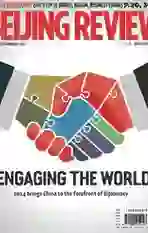Brave New World
2015-01-15
President Xi Jinpings November visits to Australia, New Zealand and Fiji and Premier Li Keqiangs one-week tour across Kazakhstan, Serbia and Thailand in December rounded off Chinas diplomatic activities for the year. During 2014, Chinese leaders made numerous visits abroad and interacted with their counterparts from a number of foreign countries, be they other developing nations, neighbors or world powers. The leadership has also drawn up a blueprint for global relations and redefined the countrys diplomatic work.
In 2014, China established partnerships with 67 countries and five regional organizations while maintaining its non-partisan status. It also made headway with the internationally acclaimed Silk Road Economic Belt and 21st Century Maritime Silk Road Initiatives, and the establishment of the Asian Infrastructure Investment Bank and the Silk Road Fund will bolster financial support for the construction of these two trade passages.
Notably, Chinas hosting of the Summit of the Conference on Interaction and Confidence-Building Measures in Asia and the APEC Economic Leaders Meeting intimated that the country has assumed a new international role. China proposed to build an Asian security concept based on common security concerns and a forward-looking Asia-Pacific partnership during the meetings. Along with its partners, it came up with the vision of a Free Trade Area of the Asia-Pacific and outlined steps for its realization. All of the above demonstrates the systemic part China now plays in safeguarding regional stability and promoting cooperative development in the Asia-Pacific. The two gatherings testified to the nations ongoing transformation to a global trendsetter.
Xi and U.S. President Barack Obama agreed to advance a new type of majorcountry relationship through facilitating cooperation and shelving differences during Obamas trip to China. China and Japan reached consensus on improving bilateral relations marred by historical and territorial disputes. In addition, China has posited a well-received “dual-track” approach to settling maritime rows in the South China Sea, stipulating that disputes be resolved through negotiations between affected countries.
Furthermore, China has maintained sound relations with Russia and the EU. It has adopted a reasonable attitude toward a series of hot-button issues including Irans nuclear program, Korean Peninsula stability, the Ukrainian crisis, the Israeli-Palestinian conflict, antiterrorism and the Ebola outbreak and stepped up to the plate in terms of maintaining international and regional peace.
Against this backdrop, the Central Conference on Work Relating to Foreign Affairs, held in late November, set out the goals of establishing a new paradigm for mutually beneficial international relations, promoting the Chinese dream internationally and working for the good of the Chinese people and people worldwide. In short, Chinas diplomacy has opened a new chapter in its storied history.
